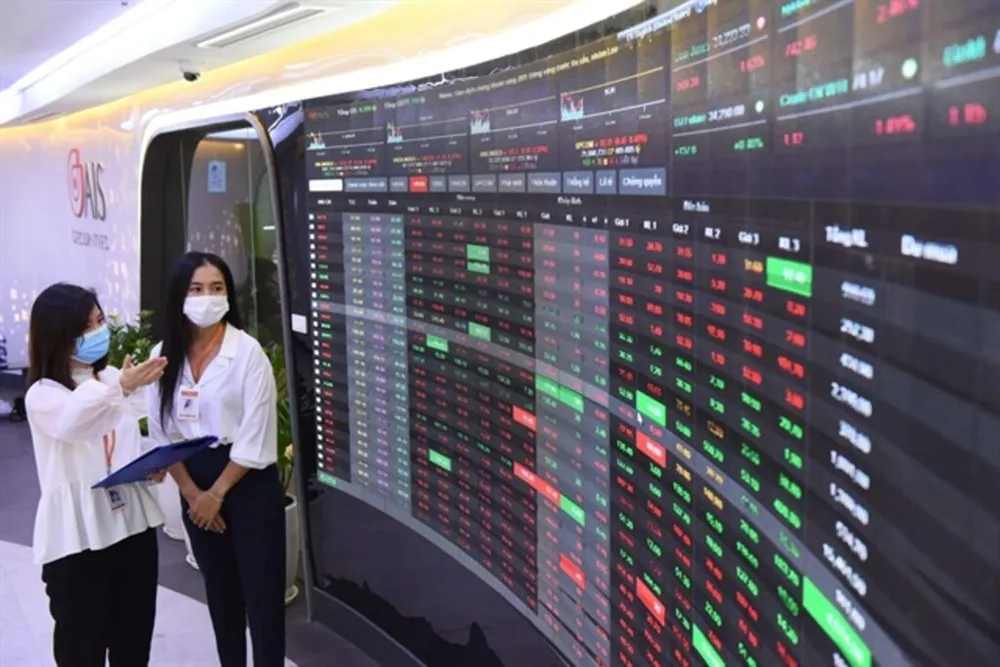
JOURNALIST: - One of the primary reasons for the sluggish stock market is weak cash flow. What do you think is the cause?
Mr. TRẦN HOÀNG SƠN: - Although market liquidity has seen sharp increases in certain trading sessions, this uptick is largely due to profit-taking pressure. We often see instances where the VN Index might rise by 10 points, only to retreat back to its original level. This fluctuation happens because of profit-taking, which triggers two key issues: high liquidity and a narrowing of gains. If high liquidity is coupled with price increases across multiple stock groups, it’s a positive sign. However, in the short term, the 1,300-point mark remains a psychological barrier for investors, serving as a “bottleneck” that’s slowing cash flow into the market.
- In a stagnant market, is it wise for investors to hold many stocks in their portfolios?
- Investors should look to the example set by major investment funds or legendary investors like Warren Buffett. Buffett typically holds a limited number of stocks in his portfolio and focuses the rest of his capital on select opportunities. Similarly, large funds in Vietnam, like Dragon Capital, often concentrate their investments on 10 or so big stocks. For individual investors, I suggest limiting your portfolio to no more than five stocks. If you’re looking to ride specific market waves, it’s best to focus on your top three picks. Spreading your investments too broadly dilutes your chances of success—returns typically come from a few high-conviction ideas.
- What advice would you give to investors debating between gold, savings, or stocks?
- In 2024, gold is expected to see a strong increase, making it a favored asset for many investors. With gold prices up about 28% since the start of the year, it presents stiff competition for the stock market. Meanwhile, savings interest rates for a 12-month term are averaging around 5%. On the other hand, the VN Index has only risen by about 12%, which is higher than savings rates but lower than the growth seen in the gold market. This disparity is influencing cash flow decisions in 2024, leading some investors to shift away from stocks.
Although the VN Index has gained approximately 12% since the beginning of the year, periodic adjustments in April and August trimmed those gains to around 5%. Such volatility is a significant deterrent for investors looking to confidently deploy their capital. Furthermore, the market’s inability to consistently break through the 1,300-point threshold has stifled cash flow.
That said, there are factors on the horizon that could encourage cash flow to return to the stock market. For one, economic growth remains strong—GDP growth for the first nine months of the year has been high, and it is forecasted that growth for the full year of 2024 could reach 7%. As the economy recovers, corporate profits are bound to follow suit.
According to Bloomberg’s latest forecasts, corporate profits are expected to grow by around 16% in 2024 compared to 2023, and by 26% in 2025. This projected growth in corporate earnings is likely to drive a renewed flow of capital into the stock market as investors seek out lucrative opportunities.
- A hot topic in the stock market today is the persistent net selling by foreign investors, which is having a negative impact on domestic investor sentiment. What are your thoughts?
- The net selling by foreign investors over the past nine months has been influenced by two main factors. First, in the first quarter of the year, Thailand’s announcement to tax overseas investments prompted a sharp withdrawal of capital from Thailand into Vietnam, causing a wave of net selling from January to April.
The second factor is the interest rate differential between the Vietnamese đồng (VND) and the US dollar (USD). From June to August, this differential widened significantly—at one point reaching 500 basis points. This disparity exacerbated net selling pressure.
However, we’ve seen some positive developments recently. Foreign investors have started to alternate between net selling and net buying sessions, thereby reducing the overall level of net selling. This is a promising sign. Additionally, last week, Bank of America reported that capital flows into emerging markets had reached their highest levels since 2007. This indicates a shift in global capital allocation as the US Federal Reserve (Fed) and European Central Bank (ECB) move to lower interest rates.
The key question now is when these capital flows will start targeting Vietnam. The country’s anticipated upgrade to emerging market status will likely attract more foreign capital in 2025 and 2026. On a more optimistic note, in the short term, the Diamond ETF fund has attracted about USD 19 million, which is a positive development. This amount of capital will likely be disbursed in the near future, adding liquidity to the market.
- In your opinion, how will the upcoming US presidential election affect the Vietnamese stock market?
- According to many analysts, if Mr. Trump wins the election, there could be smoother resolutions to conflicts in regions like the Middle East or Ukraine than if Ms. Harris or another Democratic candidate were to win. However, when we look at campaign contributions, we see a different picture. Large corporations seem to favor Ms. Harris—she has received about USD 1 billion in donations compared to USD 642 million for Mr. Trump. Big technology companies, in particular, are backing Ms. Harris.
Historically, the US economy tends to perform well leading up to presidential elections, and stock markets often see a post-election boost after the uncertainty subsides. Investors should be mindful of this period of volatility, which is expected to occur from late October to early November.
- Thank you very much for your insights.




















